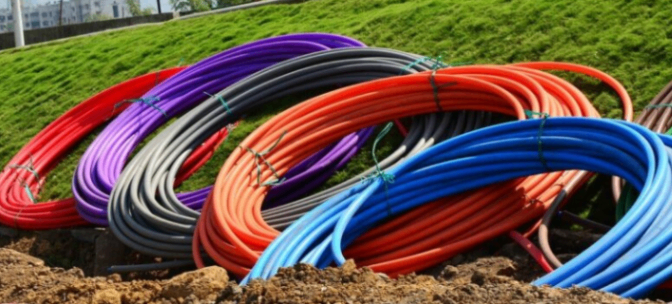Oufu Optical Fiber Cable Co., Ltd
Adresa: Shenyang, Liaoning, Sina
Persona Contacta: Menter Zhang
Telephono: 400-964-1311
Telephonum Mobile: 86 13904053308
?
2024-12-25 1552

A conduit for Fiber optic cabelem is a tubing or piping system specifically designed to house and protect Fiber optic cabelems. It serves as a pathway that ensures the cables are securely installed, protected from environmental factors, and easily maintained. Conduits can be made from various materials, including plastic, metal, or a combination of both, tailored to meet specific application requirements.
Protection from Damage:
Fiber optic cables are delicate and susceptible to damage from physical forces, moisture, and other environmental factors. Conduits provide a robust barrier that shields the cables from these potential hazards, ensuring their integrity and longevity.
Organized Installation:
Conduits allow for a neat and organized installation of Fiber optic cabelems, preventing tangling and ensuring easy access for maintenance and repairs. This organized layout also facilitates future upgrades and expansions.
Enhanced Durability:
By enclosing Fiber optic cabelems within a conduit, their durability is significantly enhanced. The conduit acts as a shield against wear and tear, extending the lifespan of the cables.
Compliance with Standards:
Www.adsscable.cn
Many industries and regulatory bodies have specific standards for the installation of Fiber optic cabelems. Using conduits helps ensure compliance with these standards, reducing the risk of safety hazards and legal issues.
Rigid Conduits:Www.adsscable.cn
These are typically made from metal or rigid plastic and offer excellent protection against physical damage. They are often used in indoor environments or in underground installations where additional strength is required.
Flexible Conduits:
Flexible conduits are made from materials that allow for bending and flexibility. They are ideal for installations where space is limited or where the conduit needs to follow a non-linear path.
Corrugated Conduits:
Corrugated conduits feature a wavy or rippled surface that provides additional strength and flexibility. They are commonly used in outdoor applications where they need to withstand environmental conditions such as wind, rain, and snow.
Proper Sizing:
Ensure that the conduit is appropriately sized for the Fiber optic cabelems being installed. Overly tight conduits can damage the cables, while overly loose ones may allow for movement and potential damage.
Routing and Support:
Plan the routing of the conduit to minimize bends and curves, which can increase signal loss. Use appropriate supports and brackets to secure the conduit in place, preventing sagging or movement.
Sealing and Protection:
Seal the ends of the conduit to prevent moisture and debris from entering. Use appropriate sealing compounds or gaskets to ensure a tight fit.
Inspection and Maintenance:
Regularly inspect the conduit and Fiber optic cabelems for signs of damage or wear. Perform maintenance as needed to ensure the continued reliability of the installation.
Conduits for Fiber optic cabelems are essential components in modern communication networks. They provide critical protection and support for Fiber optic cabelems, ensuring their safe, efficient, and reliable installation. By following best practices for conduit selection, installation, and maintenance, network administrators can maximize the performance and lifespan of their Fiber optic cabelems, ultimately enhancing the overall quality and reliability of their communication networks.
Conduit for Fiber optic cabelem
Fiber optic cable installation
Protection of Fiber optic cabelems
Types of conduits
Best practices for conduit installation